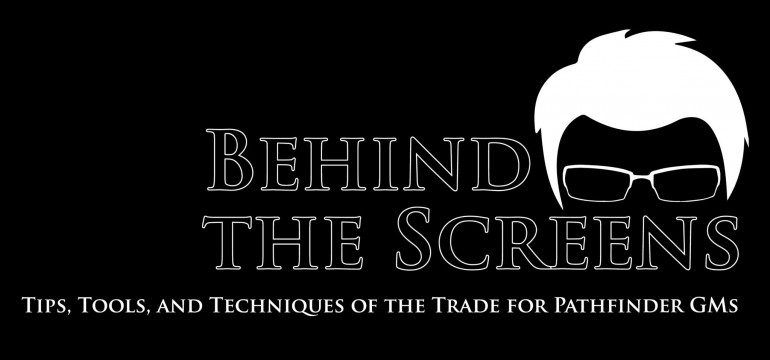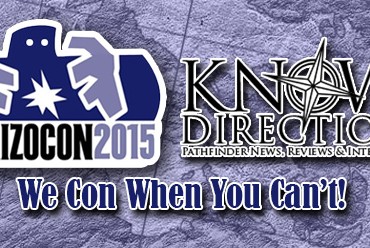About six months ago I was sitting at a table with some local Boston PFS players. The scenario was Eyes of the Ten Part 2 and we were about two hours in when I came to the sudden realization that we were all about to die. I remember two distinct emotions running through me. The first, bewilderment that we as a party had let the situation deteriorate so badly. The second, an irrational hatred for Mark Moreland, and everything he’d ever stood for. My fellow Pathfinders felt similarly. And we frantically ruffled through our Chronicle Sheets for some small and long forgotten Boon that might save us I remember thinking, wow, what a great adventure…
Why such a strong emotional response? Because we had so much to lose. After thirty four scenarios, tens of thousands of gold pieces, and countless hours of character development we were finally face-to-face with something that could end it all. And we were scared. The level of tension in the room was palpable. In the end we made it through. It was one of those fights where victory was separated from defeat by a razor thin margin. It was awesome. All because we had something to lose. Because there was so much at stake.
To have something “at stake,” expressing the idea of risking something to be lost for a potential gain, is an idiomatic metaphor that dates about half a century. The origins of the idiom are unclear but the concept of wagering, gain, and loss have many roots in traditional storytelling. Sam and Frodo march off to Mount Doom, with the fate of Middle Earth in the balance. Or Scheherazade spinning her captivating tale night after night with her life on the line.
Even in contemporary cinema provides us with numerous examples where stakes are handled well and poorly. In Mad Max: Fury Road, we’re introduced to a cast of characters, each one having a name, backstory, and reason for audience sympathy. Each and every one possessing the horrible potential to be killed off in the blink of an eye. That a character’s death and subsequent departure from the story is an ever present threat and reality adds a significant amount of tension to the narrative.
Contrast this with Avengers 2: Age of Ultron. The cast of characters has been previously introduced in other movies and the meta-knowledge of upcoming film releases pretty much guarantees that the audience can rest safely knowing that none of the titular characters are going to kick the proverbial bucket. So the fight scenes, while full of spectacular effects, lack a certain amount of dramatic tension because you knew the characters were going to be alright.
Granted, the above is admittedly an oversimplification of two very different films. But the point stands. Without the potential for loss, there’s no reason to get emotionally involved in an action scene or, in the case of an RPG, an encounter. If your PCs don’t feel threatened at least in some way by what you throw at them then they have little reason to become invested in the storyline that that encounter is a part of.
So that begs the question, what can a GM threaten PCs with?
Well, character death is the first thing that comes to mind. Players tend to get very attached to their characters so the possibility of death in any given encounter is a way of building up dramatic tension. But not every GM wants to run a deadly campaign. Not every player wants to roll dice in that kind of world. So unless you and your players have had a discussion on how comfortable they are with campaign lethality, avoid killing off their characters.
Gear is next. Many RPG players especially in a post-raiding gamer culture get unhealthily attached to their loot. We had a rogue in our Shattered Star party who couldn’t be hit, couldn’t be seen, and could Sneak Attack things for in excess of 300 damage per round. How did our GM scare him? By threatening his gear. Disintegrates, the Steal Combat Maneuver, and Sunder scared the Desna out of him.
Lastly, a GM can threaten something that the character holds dear. This is my favorite because if I’ve done it right it means that my players are fully immersed in the story and the game. Build dramatic tension by posing to threaten a person, place, or thing that a player’s character has a high regard for. This can be anything from a spouse or close family member, a property or business, or even something more abstract like an ideal or philosophy.
Remember that it’s the threat and consequences of failure that builds dramatic tension rather than the act of failing. No one likes pretending to be a hero if all that hero can do is bungle things. Learn to gradually ratchet up the tension by introducing more and more problems for your PCs to contend until they feel like they’re going to be overwhelmed. Then let them fight, skill, or diplomatize their way out. The point isn’t to kill your PCs or push them past the point where they think they can’t win anymore. Tension is like a nice single malt. In the right quantities it’s sweet, intense, and heady. But too much will ruin your night.
Have a story about pushing your PCs to the edge? Want to talk about how the new Mad Max was pretty much the best (or worst) movie ever? I want to hear it! Leave it in the comments section below!






Leave a Reply